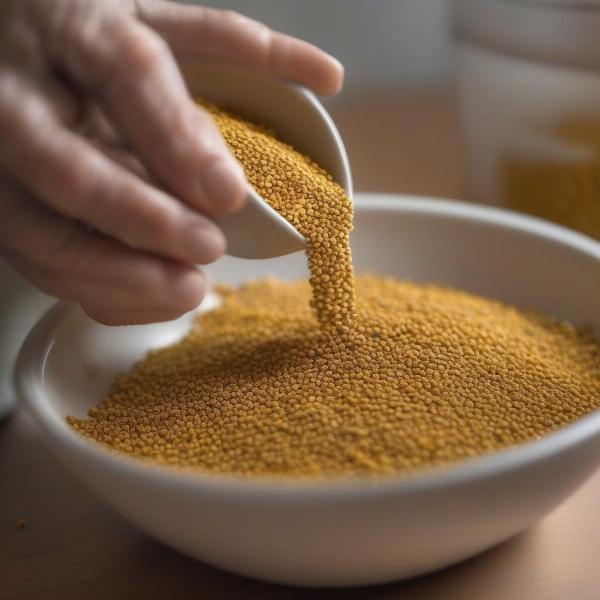Bee pollen has generated a lot of buzz lately, and not just in the beehive! Many pet owners are curious about its potential benefits for their canine companions. But is bee pollen for dogs a safe and effective supplement, or just hype? This article will delve into the potential benefits and risks of using bee pollen for dogs, providing you with the information you need to make an informed decision.
Understanding Bee Pollen and Its Potential Benefits for Dogs
Bee pollen is a mixture of flower pollen, nectar, bee secretions, enzymes, honey, and wax. It’s considered a nutritional powerhouse, packed with vitamins, minerals, antioxidants, amino acids, and fatty acids. Some proponents believe these nutrients can benefit dogs in various ways. Could bee pollen help your furry friend thrive? Let’s explore some of the potential advantages.
Some potential benefits of bee pollen for dogs include:
- Allergy Relief: Bee pollen is sometimes used to alleviate seasonal allergies in dogs. The theory is that small amounts of pollen can desensitize the immune system, reducing allergic reactions.
- Improved Skin and Coat: The nutrients in bee pollen, particularly fatty acids and vitamins, may contribute to a healthier skin and shinier coat.
- Increased Energy Levels: Bee pollen is a natural energy booster, which could be beneficial for active dogs or senior dogs experiencing fatigue.
- Immune System Support: The antioxidants and other nutrients in bee pollen may help strengthen the immune system, making dogs more resistant to illness.
- Digestive Health: Some believe bee pollen can promote healthy digestion and gut flora in dogs.
Potential Risks and Considerations of Bee Pollen for Dogs
While bee pollen offers potential benefits, it’s essential to be aware of the potential risks and use it cautiously.
- Allergies: Ironically, bee pollen can also cause allergic reactions in some dogs, ranging from mild skin irritations to severe anaphylactic shock. Start with a tiny amount and monitor your dog closely for any adverse reactions.
- Interactions with Medications: Bee pollen may interact with certain medications, such as blood thinners. Always consult your veterinarian before giving your dog bee pollen, especially if they are on any medication.
- Quality and Sourcing: The quality of bee pollen can vary significantly. Choose high-quality bee pollen from a reputable source to minimize the risk of contamination or adulteration.
- Gastrointestinal Upset: Some dogs may experience mild digestive upset, such as diarrhea or vomiting, when first introduced to bee pollen. Start with a small dose and gradually increase it as tolerated.
How to Give Bee Pollen to Your Dog
If you decide to give your dog bee pollen, start with a very small amount and monitor them closely for any adverse reactions. You can mix the pollen granules into their food or offer it as a treat. The appropriate dosage can vary depending on the dog’s size and individual needs. Always consult with your veterinarian before starting any new supplement regimen.
 How to Give Bee Pollen to Your Dog
How to Give Bee Pollen to Your Dog
Is Bee Pollen Right for My Dog?
Deciding whether or not to give your dog bee pollen requires careful consideration. While it may offer some health benefits, it’s essential to weigh the potential risks and consult with your veterinarian. They can help you determine if bee pollen is appropriate for your dog’s individual needs and health status.
What are the signs of a bee pollen allergy in dogs?
Signs of a bee pollen allergy in dogs can include itching, hives, swelling, difficulty breathing, vomiting, and diarrhea.
Can puppies have bee pollen?
It’s generally best to avoid giving bee pollen to puppies unless specifically recommended by a veterinarian.
Where can I buy high-quality bee pollen for my dog?
Look for bee pollen from reputable health food stores or pet supply stores that specialize in natural products.
How much bee pollen should I give my dog?
The appropriate dosage of bee pollen for dogs varies depending on their size and individual needs. Always consult with your veterinarian for guidance on dosage.
Conclusion
Bee pollen is a nutrient-rich substance with potential benefits for dogs, but it’s important to proceed with caution. Consult your veterinarian before giving bee pollen to your dog, especially if they have any pre-existing health conditions or are taking medication. Start with a small dose and monitor for any adverse reactions. With careful consideration and guidance from your vet, you can determine if bee pollen is a suitable supplement for your furry friend.
ILM Dog is a leading international pet website dedicated to providing dog owners with expert advice and resources on all aspects of canine care, from breed selection and health to training, nutrition, and grooming. We offer a wealth of information to help you provide the best possible care for your beloved companion. Learn more about dog nutrition and other essential pet care tips by visiting our website at ILM Dog. Contact us at [email protected] or +44 20-3965-8624 for personalized guidance.